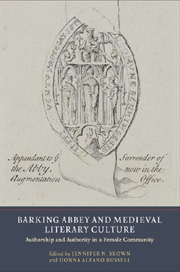Book contents
- Frontmatter
- Contents
- List of Contributors
- Acknowledgements
- List of Abbreviations
- Dedication
- Introduction: Barking's Lives, the Abbey and its Abbesses
- I BARKING ABBEY AND ITS ANGLO-SAXON CONTEXT
- II BARKING ABBEY AND ITS ANGLO-NORMAN CONTEXT
- III BARKING ABBEY AND THE LATER MIDDLE AGES
- 11 Keeping Body and Soul Together: The Charge to the Barking Cellaress
- 12 Rhythmic Liturgy, Embodiment and Female Authority in Barking's Easter Plays
- 13 Liturgy as the Site of Creative Engagement Contributions of the Nuns of Barking
- Afterword. Barking and the Historiography of Female Community
- Bibliography
- Index
- YORK MEDIEVAL PRESS: PUBLICATIONS
12 - Rhythmic Liturgy, Embodiment and Female Authority in Barking's Easter Plays
from III - BARKING ABBEY AND THE LATER MIDDLE AGES
Published online by Cambridge University Press: 05 April 2013
- Frontmatter
- Contents
- List of Contributors
- Acknowledgements
- List of Abbreviations
- Dedication
- Introduction: Barking's Lives, the Abbey and its Abbesses
- I BARKING ABBEY AND ITS ANGLO-SAXON CONTEXT
- II BARKING ABBEY AND ITS ANGLO-NORMAN CONTEXT
- III BARKING ABBEY AND THE LATER MIDDLE AGES
- 11 Keeping Body and Soul Together: The Charge to the Barking Cellaress
- 12 Rhythmic Liturgy, Embodiment and Female Authority in Barking's Easter Plays
- 13 Liturgy as the Site of Creative Engagement Contributions of the Nuns of Barking
- Afterword. Barking and the Historiography of Female Community
- Bibliography
- Index
- YORK MEDIEVAL PRESS: PUBLICATIONS
Summary
During the fourteenth century, Barking Abbey continued to be one of the most important and renowned female religious houses in England. Some time during Katherine of Sutton's tenure as abbess, from 1358 to 1376, the abbey began using plays as part of its Easter liturgy. The only extant copies of these Easter plays are found in Barking's 1404 Ordinale and Customary, a manuscript that codifies the abbey's customs and practices. As Anne Bagnall Yardley has demonstrated, both this manuscript and a fifteenth-century hymnal attributed to the abbey indicate that Barking's nuns regularly crafted their liturgy to meet the community's specific devotional needs and desires. It appears that the culture at Barking actively supported the kind of adaptation and revision involved in re-shaping the Easter liturgy through drama.
A rubric that appears immediately before Barking's ‘Harrowing of Hell’, Elevatio and Visitatio plays reads:
Nota quod secunduum antiquam consuetudinem ecclesiasticam, resurexio dominica celebrata fuerit ante matutinas et ante aliquam campane pulsacionem in die pasche, et quam populorum concursis temporibus illis uidebatur deuocione frigessere et torpor humanus maxime accrescens. uenerabilis domina Domina Katerina de Suttone, tunc pastoralis cure gerens uicem desiderans dictum torporem penitus exstirpare et fidelium deuocionem ad tam celibem celebracionem magis excitare: unanimi consororum instituit ut statim post tercium responsorium matutinarum die pasche fieret dominice resurexionis celebracio, et hoc modo statuetur processio.
- Type
- Chapter
- Information
- Barking Abbey and Medieval Literary CultureAuthorship and Authority in a Female Community, pp. 245 - 266Publisher: Boydell & BrewerPrint publication year: 2012



